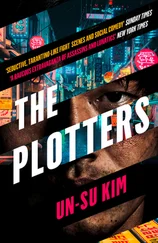Suki Kim - The Interpreter
Здесь есть возможность читать онлайн «Suki Kim - The Interpreter» весь текст электронной книги совершенно бесплатно (целиком полную версию без сокращений). В некоторых случаях можно слушать аудио, скачать через торрент в формате fb2 и присутствует краткое содержание. Город: New York, Год выпуска: 2011, ISBN: 2011, Издательство: Picador, Жанр: Детектив, Триллер, на английском языке. Описание произведения, (предисловие) а так же отзывы посетителей доступны на портале библиотеки ЛибКат.
- Название:The Interpreter
- Автор:
- Издательство:Picador
- Жанр:
- Год:2011
- Город:New York
- ISBN:0-312-42224-5
- Рейтинг книги:3 / 5. Голосов: 1
-
Избранное:Добавить в избранное
- Отзывы:
-
Ваша оценка:
- 60
- 1
- 2
- 3
- 4
- 5
The Interpreter: краткое содержание, описание и аннотация
Предлагаем к чтению аннотацию, описание, краткое содержание или предисловие (зависит от того, что написал сам автор книги «The Interpreter»). Если вы не нашли необходимую информацию о книге — напишите в комментариях, мы постараемся отыскать её.
The Interpreter — читать онлайн бесплатно полную книгу (весь текст) целиком
Ниже представлен текст книги, разбитый по страницам. Система сохранения места последней прочитанной страницы, позволяет с удобством читать онлайн бесплатно книгу «The Interpreter», без необходимости каждый раз заново искать на чём Вы остановились. Поставьте закладку, и сможете в любой момент перейти на страницу, на которой закончили чтение.
Интервал:
Закладка:
The austerity of the room suggests a typical municipal agency. The lack of windows is intentional. This must be what a prison feels like, she thinks. The walls are sealed in off-white paint. The table and chairs are so generic that they appear to have been hauled right out of a Kmart window. Curiously, it reminds her of her own apartment, the bareness, the chilling stillness, the unspecified waiting. It could be 4 a.m. still, and Suzy, alone, wishing for sleep.
“Ms. Suzy Park? James Richards, Assistant DA.” He is tall, somber, in a dark suit that matches the furniture. He hands her his card and points to the man standing next to him. “You’ll be interpreting for Mr. Lee here.”
Against the ADA, whose six-foot-four frame seems unsettling under the low ceiling, Mr. Lee looks timid, although he is not small for a Korean man. In a stiff black suit and a starched white shirt, he could almost pass for a lawyer, or an undertaker. Koreans tend to overdress at depositions. Lawyers and judges, in fact, anyone to do with the law, are taken ultra-seriously, and witnesses put on their cleanest, smartest outfits, as though these meetings were Sunday mass. It is their way of showing courtesy before the law, although such effort might mislead the opposing council to assume that the witness’s claim of economic hardship must be a fabrication. But a deposition is an event for these immigrant workers. A brush with the American law does not happen every day, never mind the summons from the Office of the Attorney General. For those who labor seven days a week at groceries, nail salons, dry cleaners, when, if not now, would they ever get a chance to don their fake Gucci, Armani, Rolex?
His face looks too tanned for a dry cleaner. Deli or grocery, maybe. But his hands have seen too much dirt and sun, which could only mean fruits and vegetables. The mystery does not last long, for the ADA sets down the folder he’s been carrying: “Case 404: Office of the Attorney General Labor Bureau in the Matter of the Investigation of Lee Market, Inc. of Grand Concourse, New York.”
Mr. Lee nods slightly, the way Koreans greet each other in formal settings. Suzy nods back, a bit more deeply, since he is obviously older and requires more respect.
“Ms. Park, this is just a preliminary questioning, so no stenographer will be present. Will you ask him if he understands that he has the right to be represented by a lawyer under the law?”
James Richards has a kind voice, and Suzy is glad for Mr. Lee, who looks nervous, almost rigid, the way he knits his eyebrows as if trying to understand the flow of language that escapes him.
It ’ s okay , she tells him. Don’t worry too much , she says before translating what has been uttered by the ADA.
He answers, “Yes, I understand, I cannot afford a lawyer, I have no time to find a lawyer, I work twelve hours a day, I work seven days a week, I barely have time to sleep, I’ve done nothing wrong.”
Suzy translates his answer, and the ADA nods eagerly, as if to acknowledge the man’s concern.
“Mr. Lee, no one’s accusing you of wrongdoing. You’ve been summoned here for a few questions in response to the complaints we’ve received, the source of which I cannot reveal to you due to the laws of confidentiality. The investigation has only just begun. This might lead to depositions and hearings, but for now all we are here to do is to ask you some questions, and to have you tell the truth.”
Suzy scribbles a few key words into her notepad while the ADA speaks. No matter how long a sentence, she must not leave out a single word in her translation. An interpreter is like a mathematician. She approaches language as if it were an equation. Each word is instantly matched with its equivalent. To arrive at a correct answer, she must be exact. Suzy, unbeknownst to herself, has always been skilled at this. It cannot be due to her bilingual upbringing, since not all immigrant kids make excellent interpreters. What she possesses is an ability to be at two places at once. She can hear a word and separate its literal meaning from its connotation. This is necessary, since the verbatim translation often leads to confusion. Languages are not logical. Thus an interpreter must translate word for word and yet somehow manipulate the breadth of language to bridge the gap. While one part of her brain does automatic conversion, the other part examines the linguistic void that results from such transference. It is an art that requires a precise and yet creative mind. Only the true solver knows that two plus two can suggest a lot of things before ending up at four.
But she is being more flexible than usual when she turns to the witness and repeats the ADA’s words, adding at the end, You should really bring a lawyer next time; in fact, if you want, you can stop this right now and request one.
Mr. Lee meets her eyes and says, “No, I will be fine, I will tell it as it is, tell this guy here I don’t lie.”
From the way the ADA twirls the pen between his thumb and his index finger, Suzy can tell that the real questioning is about to begin.
“What is your full name?”
“Lee Sung Shik.”
Koreans put their last names first. It is the last name that matters. The last name determines the status, the family history, the origin. Older people often refer to each other by last names only. All last names come from different roots. There might be twenty separate sects of Lee, or fifty divisions among Kim. Lee of the Junju sect bears no relation to Lee of the Junuh sect. Each sect carries its own registry of thousands of years, which documents the class status. Americans love to say that all Koreans are named Kim, but Koreans do not look at it that way. To them, all Kims are not the same. In fact, there is often a world of class difference between two sects of Kim. For example, Kim of the Kyungju line descends from noble blood, whereas another sect of Kim might trace its ancestry among the commoners. It is all in the last name. So it is not unusual for Koreans to skip first names altogether. Many deposition transcripts get mixed up because of this switch of the name order. Lawyers who often handle Korean cases immediately ask Suzy at the beginning of a deposition please to put last names last in her translation. Do it in the American way, they say.
“Mr. Lee, what, if any, is your involvement with the store located at 458 Grand Concourse?”
“I am the owner,” Mr. Lee answers.
“How long have you been the owner of the store located at 458 Grand Concourse?”
“Four years.”
“Before that, where did you work?”
“I was unemployed.”
“For how long?”
“For approximately a year.”
“Before that, did you work at all?”
“I was employed at a fruit-and-vegetable store.”
“By whom?”
“They are dead now.”
“What were their names?”
This is where Suzy falters. This is where Suzy is afraid she will know the answer.
What were their names?
It takes her a second longer to translate the question, so easy, although the answer is even easier. She really should not be here.
“Mr. Park and his wife, over in the South Bronx; I never knew their first names.”
So he had known her parents. He’d worked for them five years ago, which must have been right around the time of their death. This man here, with stubby fingers and swarthy face, had seen Mom and Dad every day. It should not surprise her. The Korean community is not big, after all. Many workers passed through the store in the South Bronx during the eight years in which her parents owned it. Turnovers seemed unusually frequent. When Suzy asked Dad why, she was told to stay out of their business. They had bought the store the year Grace went away to college. Before that, they kept changing jobs almost every year. Neither of her parents stuck to one job for long. One of them always got fired for one reason or another. With each new job came a move. Sometimes the relocation made the commute easier for her parents. But more often, they moved for no reason whatsoever. The family never stayed in one address for longer than a year. It was as if they were on the run. From what, Suzy had no clue. Once they bought the store, things calmed down a bit. They moved less often, although by then both girls had moved into dorms at Smith and Columbia. Suzy was surprised that her parents had saved enough money to buy a store finally, and was even more shocked when Mom told her about the brownstone in Woodside, Queens. They closed on the house soon after she ran off with Damian. Suzy never got to see it.
Читать дальшеИнтервал:
Закладка:
Похожие книги на «The Interpreter»
Представляем Вашему вниманию похожие книги на «The Interpreter» списком для выбора. Мы отобрали схожую по названию и смыслу литературу в надежде предоставить читателям больше вариантов отыскать новые, интересные, ещё непрочитанные произведения.
Обсуждение, отзывы о книге «The Interpreter» и просто собственные мнения читателей. Оставьте ваши комментарии, напишите, что Вы думаете о произведении, его смысле или главных героях. Укажите что конкретно понравилось, а что нет, и почему Вы так считаете.












